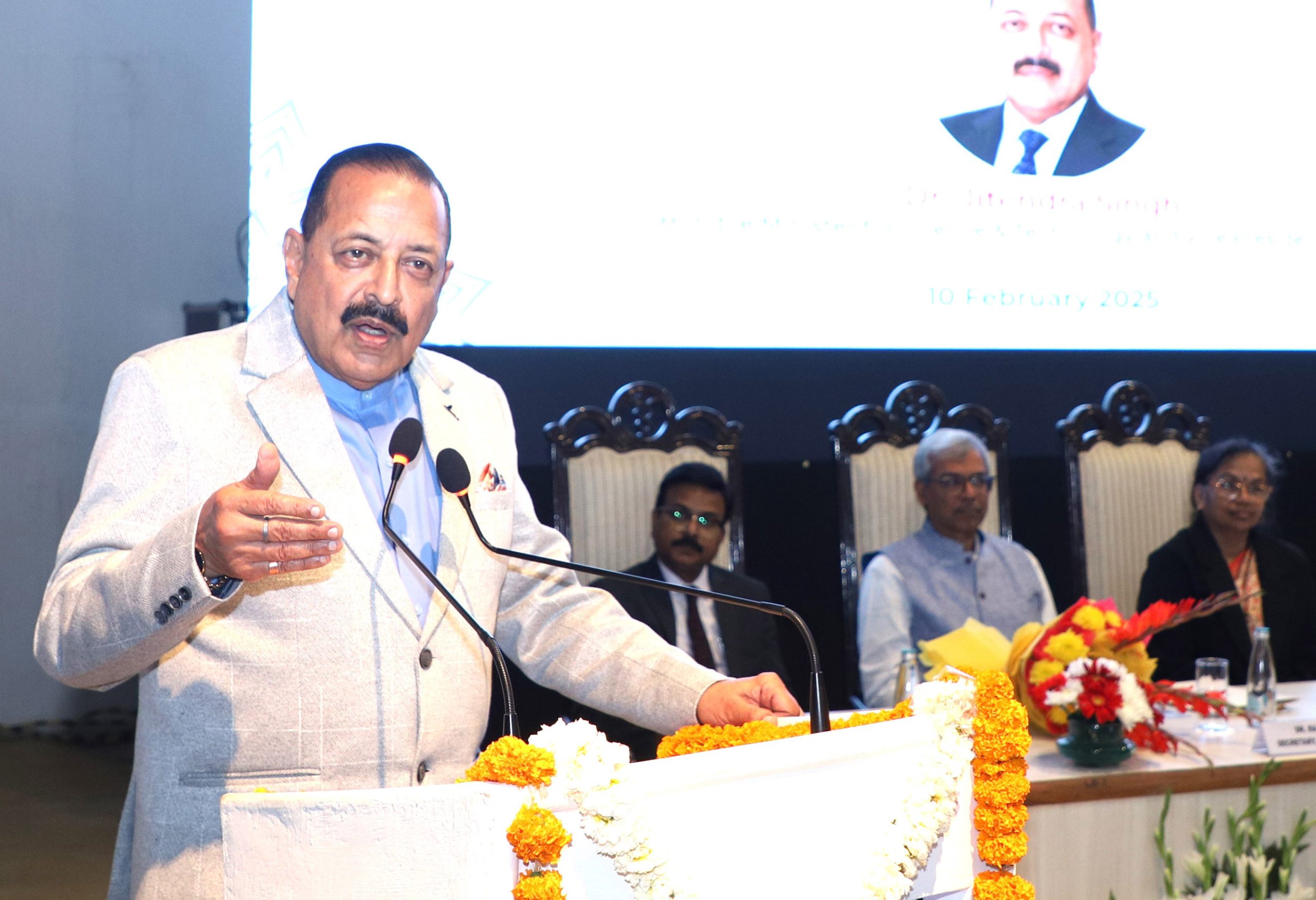NEW DELHI, Feb 10: Union Minister Dr. Jitendra Singh inaugurated India’s first indigenous Automated Bio Medical Waste Treatment Plant at AIIMS New Delhi.
The Automated Biomedical Waste Treatment Rig, named “Sṛjanam,” was officially dedicated to the nation during a ceremony held at the AIIMS auditorium. Following the event, the Minister, along with Director General CSIR Dr. N. Kalaisevi and Director AIIMS Dr. M. Srinivas, proceeded to the site within AIIMS premises to formally activate the equipment.
This groundbreaking, eco-friendly technology, developed by CSIR-NIIST (National Institute for Interdisciplinary Science and Technology), represents a major step forward in sustainable biomedical waste management.
During the commissioning, Minister of State (Independent Charge) Science & Technology; MoS PMO, Personnel, Public Grievances, Pensions, Atomic Energy and Space, Dr. Jitendra Singh advocated for a shift from ‘Waste to Wealth,’ highlighting the critical need for sustainability and environmental stewardship. He noted India’s economic transformation from being part of the fragile five to a top performer and underlined the importance of the new biomedical waste treatment rig, which is expected to revolutionize waste management in healthcare facilities.
The “Sṛjanam” rig is capable of disinfecting pathogenic biomedical waste, including blood, urine, sputum, and laboratory disposables, without reliance on expensive and energy-consuming incinerators. Notably, it also adds a pleasant scent to normally foul-smelling toxic waste. With a daily processing capacity of 400 kg, the system can initially manage 10 kg of degradable medical waste per day, and is set to enter full-scale operation upon validation and approval from relevant authorities.
In light of the increasing demand for improved waste disposal methods, the “Sṛjanam” rig provides a safer and more effective alternative, significantly reducing the risks associated with direct human contact with hazardous waste and lowering the potential for spills and accidents. Third-party validation has confirmed its antimicrobial effectiveness, showing that the treated waste is safer than organic fertilizers like vermicompost.
Dr. Jitendra Singh praised CSIR-NIIST for delivering an innovative and cost-efficient solution for eco-friendly disposal of pathogenic biomedical waste. He referenced the 2023 annual report from the Central Pollution Control Board (CPCB), which revealed that India produces 743 tonnes of biomedical waste daily, posing a massive challenge for its safe handling and disposal. This new technology offers an environmentally responsible alternative to conventional incineration methods.
He explained that improper waste management practices, such as inadequate segregation, open dumping, open burning, and ineffective incineration, lead to significant health risks, including the release of carcinogens and particulate matter. He stressed the importance of effective waste management practices to control the spread of infectious diseases and combat antimicrobial resistance.
Acknowledging the contributions of Prime Minister Narendra Modi, Dr. Jitendra Singh highlighted the PM’s commitment to advancing India’s scientific and technological capabilities while also promoting green initiatives. He also commended Shri. Tanmay Kumar, Secretary of the Ministry of Environment, Forest, and Climate Change (MoEFCC), for his swift action in securing the necessary project clearances.
In his remarks, Dr. Singh noted other technological achievements by India, such as the nation’s first indigenous DNA vaccine, the development of an HPV vaccine for cervical cancer prevention, and significant advancements in space technology. He also pointed out India’s innovations in pharmaceuticals, including the indigenous antibiotic ‘Nafithromycin’ and the first gene therapy trial for hemophilia supported by the Department of Biotechnology (DBT).
The Vice-President of CSIR, Dr. Jitendra Singh, brought attention to the ‘One Week One Lab’ initiative, designed to promote awareness of CSIR’s pioneering projects, such as the first hydrogen buses created by NCL Pune and the off-season tulips cultivated by CSIR Palampur.
Additionally, he emphasized the government’s priorities during its initial 100 days, including approval for India’s first Bio E3 policy, allocation of 1000 crores for Viability Gap funding for space startups, 2000 crores for Mission Mausam, and 50,000 crores for the Anusandhan National Research Foundation (NRF). He also noted the recent Union Budget proposal of 20,000 crores for Bharat Small Modular Reactors (SMRs).
Concluding his speech, Dr. Jitendra Singh called for increased academic collaboration among institutions and suggested involving postgraduate students as co-guides in exchange programs to enhance synergy and collective learning. He reaffirmed the government’s steadfast commitment to science, technology, and innovation under PM Modi’s leadership, stating, “This initiative reflects the government’s vision of a ‘Viksit Bharat’ by 2047, and with ongoing advancements in innovation and sustainable technologies, India is poised to become a global leader in environmental and healthcare solutions.”
The ceremony was graced by notable dignitaries including Dr. V. K. Paul, Member, Niti Aayog, Dr. Rajiv Bahl, Secretary, DHR and DG, ICMR, Tanmay Kumar IAS, Secretary MoEFCC, Dr. N. Kalaiselvi, Secretary DSIR and DG, CSIR, and Dr. M. Srinivas, Director, AIIMS.


Leave a Reply